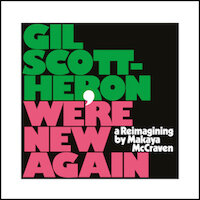Label: International Anthem, 2022
Personnel - Greg Ward: alto sax; Irvin Pierce: tenor sax; Marquis Hill: trumpet, flugelhorn; De'Sean Jones: flute; Jeff Parker: guitar; Matt Gold: guitar, baby sitar; Joel Ross: vibraphone, marimba; Brandee Younger: harp; Greg Spero: piano; Rob Clearfield: piano; Macie Stewart: violin; Zara Zaharieva: violin; Marta Sofia Honer: viola; Lia Kohl: cello; Junius Paul: double bass, electric bass, percussion; Makaya McCraven: drums, sampler, percussion, tambourine, baby sitar, synths, kalimba, handclaps, vibraphone, wurlitzer, organ.
The finicky drummer and beat inventor Makaya McCraven has been lauded for his exquisite blend of styles, irresistible moods, and melodies that linger, sending the listener to emotional zones both distinctive and appealing. This new record, In These Times, has 11 tunes providing a spotlight for his entrancing rhythms and adroit arrangements, with soul, jazz, funk, and dub rippling across sonic fabrics woven with the help of an all-star ensemble.
The title track incorporates an audio excerpt from the Studs Terkel Radio Archive, setting ostinatos against one another before unifying them into a beautiful melody complemented with a phenomenal beat, sweeping harp, and bowed cello. The triple meter flow occasionally shifts to 6/8, and a soulful saxophone solo finds its way to pleasant emotion.
A wide variety of pulses are offered, and if “The Fours” discloses an intense foreign flavor by virtue of stringed instruments and odd, looping rhythms founded on deep and wet drum sounds, then “High Fives”, delivered in five, adds bass sounds and textural guitar for a richer tissue. In contrast, the polyrhythmic “Seventh String” has the soaring flute lines of De'Sean Jones creating contrast with McCraven’s disorienting drumming.
No element feels forced or inappropriate, and “This Place That Place” proudly invests in both fragmentation and coordination, stressed under a peculiar swinging vibe. The easterner “So Obuji” and the regularly riffing “The Title” boast a strong dub feel that gets mixed with soul elements, whereas the boom-bap/boom-boom-bap sequence of “The Knew Untitled” entices the guitarist Jeff Parker for a skillful improvisation pelted with bluesy licks.
McCraven’s elocution is clean, precise, and confident, reaching expressions that practically demand to be heard and felt. This is an album that is alive with revelatory emotion and a tonal quality that reveals a serious commitment to his message and art.
Favorite Tracks:
01 - In These Times ► 02 - The Fours ► 10 - The Knew Untitled








